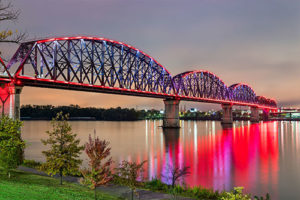 Governor of Kansas Laura Kelly recently announced $40.5 million in financing for the state’s 33 municipal and off-system bridge projects. This announcement is a component of two municipal bridge renovation initiatives that have been modified to make use of new money sources created by the Bipartisan Infrastructure Law (BIL), which was passed by the federal government.
Governor of Kansas Laura Kelly recently announced $40.5 million in financing for the state’s 33 municipal and off-system bridge projects. This announcement is a component of two municipal bridge renovation initiatives that have been modified to make use of new money sources created by the Bipartisan Infrastructure Law (BIL), which was passed by the federal government.
According to the state, about 5,000 of Kansas’ 19,300 local road system bridges, or about 26% of them, are in disrepair or cannot support the current weight and vehicle standards.
Governor Laura Kelly stated, “My administration is committed to improving Kansas’ transportation system, including city- and county-owned bridges in need of overdue repairs. These bridge programs demonstrate how, by fostering partnerships among all levels of government, we can build a robust, responsive infrastructure system that provides efficient and safe transportation routes and boosts state and local economies.”
In a joint statement, Kelly and Julie Lorenz, the secretary of transportation for Kansas, noted that two bridge rehabilitation programs had been updated to take use of the $137.5 million in federal infrastructure funding that Kansas is expected to receive over the following five years.
According to Secretary Lorenz, “These neighborhood bridges are the lifeblood of many communities. Most [agriculture] loads start in a field, are placed in a truck, and have to cross a county bridge to get to a state highway or rail line. Congratulations to these Kansas communities for partnering with KDOT and securing local matching funds that keep critical bridges open to the public and moving commerce.”
Kansas is anticipated to receive $2.8 billion in federal assistance over five years to repair the 1,321 bridges and more than 1,995 miles of road that are considered to be in bad condition. Kansas had been given more than $1 billion in specifically designated money as of the end of October for road and bridge repairs in 2022.
The money received by the state’s Off-System Bridge Program from the federal government increased from $8 million to $20.5 million. KDOT created the program to meet a federal mandate that not less than 15% of a state’s allocation of Federal Highway Administration bridge funds (a grant program to repair bridge structures in danger of deteriorating into poor condition) be used to replace or renovate qualified bridges situated on roadways outside of the federal aid system.
From a pool of 99 applications, the state’s Department of Transportation chose 22 projects to receive federal grants totaling $460,000 to $1.4 million for the federal fiscal year 2024, which runs from October 1, 2023, to September 30, 2024. The applications sought a total of $84 million from the federal government for the state to repair off-system bridges.
A bridge must be deemed in bad condition by the National Bridge Inspection Standards in order to qualify for state funding under the Off-System Bridge Program.
States can also use federal infrastructure dollars from FHWA to rehabilitate bridges. States are encouraged by FHWA to give federal bridge financing to areas that have previously lacked the funding for such projects. For instance, if a state has 50% of its highway bridges (by count or deck area) that are off-system and in bad condition, FHWA recommends the state to utilize 50% of its federal bridge money to address those requirements. Kansas used both federal funding and local expenditures, ranging from 4% to as much as 24.3% of the total expenses for its off-system bridges.
Similar yet distinct qualifying standards apply to municipal and county bridges that are not part of the state highway system for both of KDOT’s two bridge repair programs for off-system and local bridges.
Both initiatives get funding through an application procedure, which typically includes a local contribution. KDOT selects bridges based on their condition, the length of the detour, their incapacity to handle legal payloads, and their prior project experience.
The Kansas Local Bridge Improvement Program saw an increase from $5 million to $20 million thanks in part to federal funding. Ten local bridges that are in need of replacement will be done so by KDOT, while seven others will be permanently taken out of service.
For a bridge to be eligible for this program, it must either be closed owing to structural defects and previously deemed functionally outdated, or it must require rapid restoration in order to stay open. KDOT received 114 submissions totaling more than $126 million for the regional bridge upgrades in competition for the $20 million granted.




